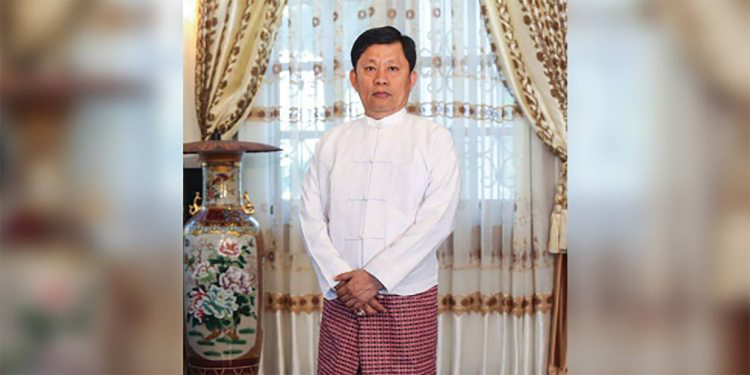The Myanmar regime is reportedly planning to prosecute some business owners, including cronies Thein Win Zaw and Mu Mu Shein, who are currently being questioned in connection with the activities of jailed former lieutenant general Moe Myint Tun.
Former junta trade chief Moe Myint Tun was sentenced to life imprisonment—a term equivalent to 20 years behind bars—in the second week of October for corruption. Many high-ranking officials of the regime and hundreds of businesspeople were also detained and questioned last month amid a crackdown on surging commodity prices.
A fuel distributor told The Irrawaddy: “The regime has not yet released anyone, despite earlier saying it would. But it has not yet imprisoned them. Moe Myint Tun and his team never issued permits or approvals unless they were paid. So, all the business owners had more or less given bribes to him, and all were involved.”
Thein Win Zaw, who reportedly has close ties to junta chief Min Aung Hlaing’s family, is the owner of Shwe Byain Phyu Co. (SBP), which has interests in gas stations, gem mining, telecoms and logging. The company is one of the regime’s top taxpayers.
SBP was established in 1996 when Myanmar was ruled by former military dictator Than Shwe. It operates in partnership with military-owned Myanmar Economic Holdings Ltd. in mining and the import and distribution of fuel. SBP also has a substantial stake in telecom operator ATOM, formerly the Myanmar subsidiary of Norwegian telecom giant Telenor.
Another high-profile detainee, Mu Mu Shein, is an executive director of Moon Sun Energy Co.
It is not clear what charges the business owners face, but under the Anti-Corruption Law, anyone who incites, plots with or aids and abets someone who violates the law is liable for prosecution and faces a maximum penalty of seven years in prison plus a fine.
The owners of many fuel distributors including Denko, BOC, Yangon Petrol, Moon Sun Energy and Shwe Byain Phyu have been detained and interrogated in connection with Moe Myint Tun’s corruption case.
Merchants selling cooking oil, rice, corn, and beans and pulses, as well as members of the Union of Myanmar Federation of Chambers of Commerce and Industry and money changers, were also detained and questioned last month.
Along with Moe Myint Tun, his assistant, ex-brigadier general Yan Naung Soe, was also given 20 years in prison for corruption.
Moe Myint Tun was the chairman of the Myanmar Investment Commission, the Foreign Exchange Supervisory Committee, and the Central Committee for Ensuring Smooth Flow of Trade and Goods. Yan Naung Soe was a secretary of the latter, which was tasked with regulating US dollar expenditures, and facilitating the trade and flow of goods, including the import and distribution of fuel and cooking oil.
A business owner in Yangon told The Irrawaddy: “I am sure Ko Thein Win Zaw is involved. I don’t know if the regime will punish those business owners publicly or secretly. I heard [Ko Thein Win Zaw] will be given a minimum of three years in prison.”
“Distributors are limiting their sales [because of the recent detentions]. It is easier to acquire dollars now, and the [unofficial market] exchange rate is around 3,300 kyats per dollar,” said the businessman.
A legal advisor who asked for anonymity said: “Anyone who aids and abets or fails to report to authorities about corruption will also face punishment.” The penalties are less severe than those for taking bribes, he said.
The regime has reorganized its Supervisory Committee on Import, Storage and Distribution of Fuel Oil, which was previously headed by Yan Naung Soe and Deputy Commerce Minister Nyunt Aung, who is also being questioned by the regime.
The committee is now led by the deputy energy minister; its members include officials from the Commerce and Energy ministries.
The regime prosecuted some high-profile businessmen last year in corruption cases filed against the ousted leaders of the National League for Democracy government following the 2021 coup. Among them are Eden Group of Companies chairman U Chit Khine and his son Win Min Khine, and Yangon Petrol Co. director Zin Min Aung.

















